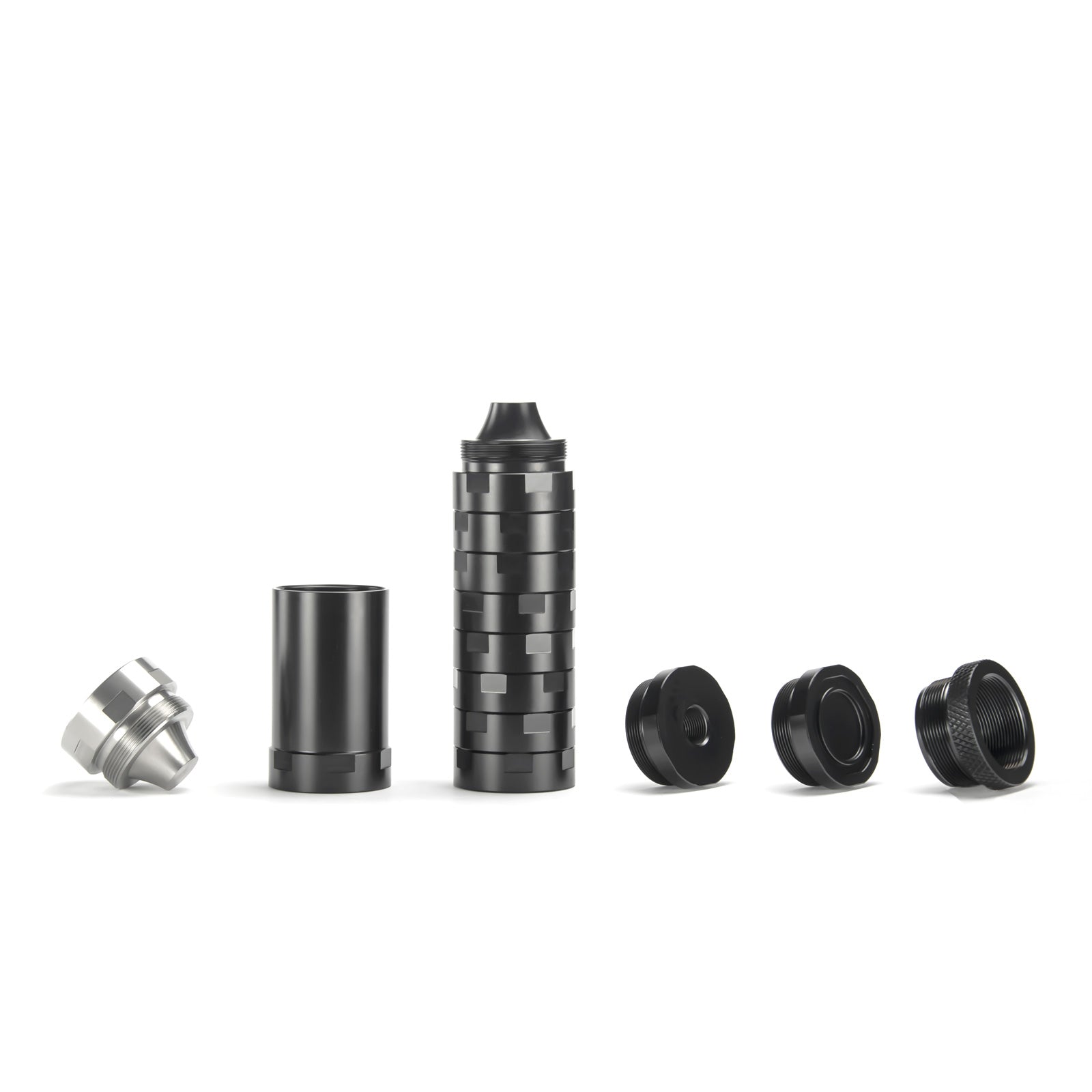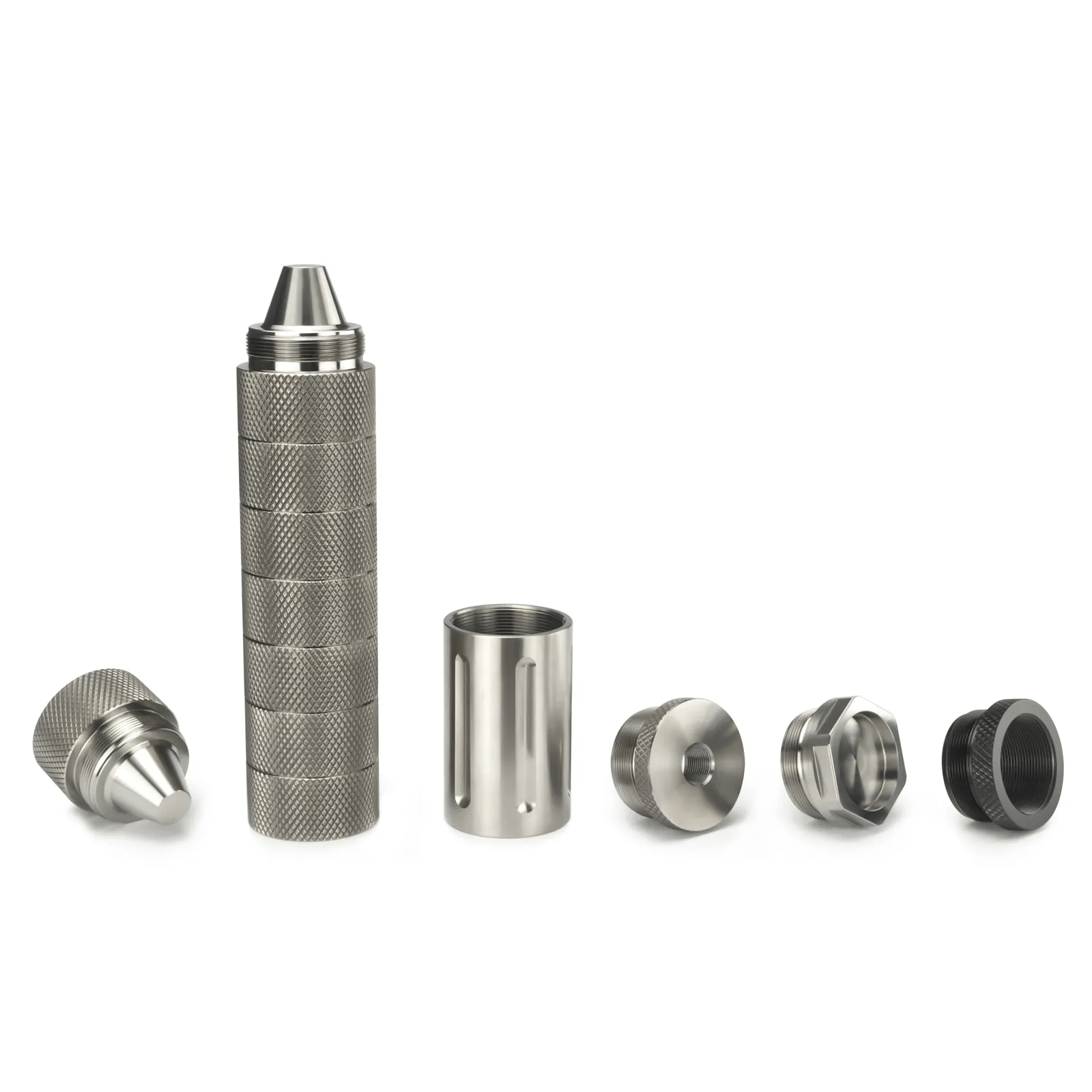
Introduction:
In the gun world, the materials you choose for things like accessories really matter. They can change how well the gun works, how long it lasts, and how safe it is. Solvent traps, which help make cleaning guns easier, are now really popular. But there’s a big question: should you choose Titanium or Aluminum? This article looks at both, showing the good and bad sides of each, with real data, examples, and studies to help you understand better.

1. The Cost Factor: Aluminum vs. Titanium
When you’re looking at solvent traps, how much they cost is really important. Titanium ones are more expensive than aluminum ones, costing about 5 to 10 times more. This might seem pricey. The cost depends on what kind of metal is used, how thick the material is, and how complex the design is. So, all these things add up to decide how much you’ll pay in the end.
Case Study: Making titanium involves complex steps like machining, forging, and heat treating. These processes, along with the heavier weight of titanium, can make shipping and handling more expensive. But, even with these higher costs, titanium’s long-lasting durability could mean you save money over time since it doesn’t wear out quickly.
2. Heat Dissipation: A Critical Component
Guns get really hot when used, and it’s important to get rid of this heat quickly to stop the barrel from getting damaged. Titanium is better at moving heat away than aluminum. This means it can cool down the gun faster, helping to keep it in good shape and working properly.
3. Weight Matters: Aluminum vs. Titanium
The weight of a material is really important, especially when it’s part of a gun. Titanium is about 66% heavier than aluminum, which might seem like a downside. But the big question is whether this extra weight affects the strength and lasting quality of the material. In other words, does being heavier mean it’s not as strong or durable?
Example: Think about two solvent traps: one is made of titanium, and the other is made of aluminum. The aluminum trap is lighter, which might seem better at first. However, the titanium trap is stronger and lasts longer, so many people actually prefer it despite its heavier weight. This choice shows how durability can be more important than just being lightweight.
4. Corrosion Resistance: The Longevity Aspect:
The gases from gunpowder can make the barrel of a gun wear out faster. Titanium has a special layer on it that’s really good at stopping this kind of wear and tear, known as corrosion. This makes titanium a better choice than aluminum, especially in places where there’s salt (like chloride ions) in the air or water, which can also cause corrosion. So, if you’re worried about your gun’s barrel getting damaged, titanium might be the way to go.
5. Yield Strength: Handling the Pressure
When a gun is fired, the gases inside expand rapidly, putting a lot of pressure on any materials used in the gun. Both titanium and aluminum are strong and can handle this pressure, known as yield strength. However, titanium is generally stronger under these high-pressure situations than aluminum. This strength makes titanium a better choice for gun parts that need to handle a lot of pressure, like in some high-powered firearms.
Data Insight: Titanium alloys typically showcase yield strengths between 275-550 MPa, while aluminum alloys range between 100-350 MPa.
6. Melting Point: Heat Resistance in Focus
How well a material can handle high temperatures depends a lot on its melting point. Titanium can withstand a lot more heat because it has a much higher melting point — between 1650-1670°C — compared to aluminum, which melts at around 660.37°C. This means titanium is a better choice for things that get really hot, like certain parts of a gun that deal with intense heat.
7. The Final Verdict: Aluminum vs. Titanium
Aluminum solvent traps are lighter and cheaper, but if you really care about how long something lasts and how well it performs, they might not be the best choice. On the other hand, titanium solvent traps are more expensive and heavier, but they’re a lot stronger, can handle high heat better, and don’t corrode easily. So, for people who want their solvent trap to last a long time and work really well, even if it costs more, titanium is often the way to go.
Case Analysis: Consider a scenario where a firearm enthusiast has to choose between an aluminum and a titanium solvent trap. While the initial cost of the aluminum trap might be tempting, the long-term benefits of the titanium trap, such as durability and superior performance, make it a worthy investment.
8. Conclusion:
Choosing between titanium and aluminum for solvent traps really comes down to what you prefer, what you need, and how much you want to spend. Aluminum is more affordable and lighter, which is great for some. But, titanium is the standout choice for its long-lasting nature, strength, and ability to handle heat. Before you decide, think carefully about the good and bad points of each material. That way, you can pick the one that fits best with what you’re looking for.
Note:
Always consult with experts and conduct thorough research before making any purchase decisions related to firearm accessories.

